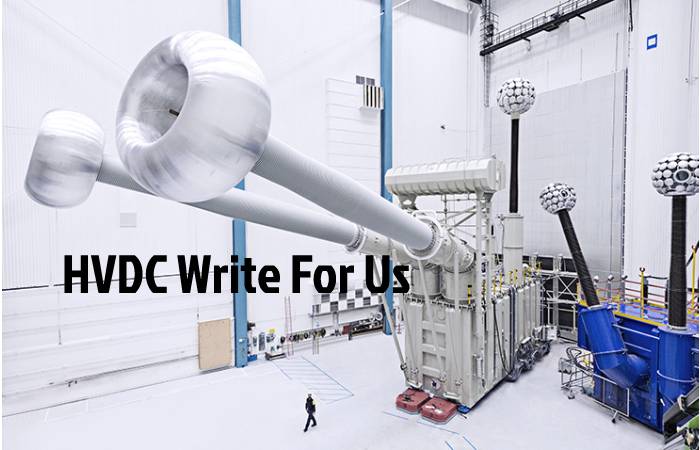HVDC Write For Us
HVDC Write For Us- High-voltage direct current (HVDC) is a method of transmitting electrical power over long distances using direct current (DC) instead of the more common alternating current (AC). It is transmission systems have advantages over AC transmission systems, including lower power losses, reduced conductor material requirements, and the ability to connect asynchronous grids. If you have created a well-written and researched article or have come up with a great topic, pitch it to our team by emailing contact@infoblogmedia.com
HVDC transmission systems are used for long-distance power transmission, such as between hydroelectric power plants, load centers, offshore wind farms, and onshore substations. They are also used for underground power transmission, as HVDC cables can be buried in the ground without expensive insulation.
The first commercial HVDC transmission system was built 1954 between Sweden and Gotland. Since then, HVDC technology has created some of the world’s most extended and powerful power lines, including the 3,300 km (2,050 mi) HVDC link between the Xiangjiaba power plant in China and the Guizhou grid.
HVDC transmission is a crucial technology for integrating renewable energy sources into the network, as it is used to transmit power from remote locations to load centers. HVDC transmission is used to develop “super grids,” large-scale interconnected power grids that span entire continents.
HDVC Can Refer To Two Different Things:
HD Visual Communications System is a video conferencing system developed by Panasonic. It is a high-definition video conferencing system that can connect up to 24 sites simultaneously. HDVC Mobile is a specialized HDVC application for iOS, Android™, or Windows* that can participate in video conferences anywhere using your tablet, smartphone, or computer.
High-voltage direct current (HVDC) is a method of transmitting electrical power over long distances using direct current (DC) instead of the standard alternating current (AC). HVDC transmission systems have advantages over AC transmission systems, including lower power losses, reduced conductor material requirements, and the ability to connect asynchronous grids.
HVAC And HVDC Are Two Different Methods Of Transmitting Electrical Power.
HVAC stands for High-Voltage Alternating Current. It is the most common method of transmitting electrical power over long distances. AC power is generated by alternating current generators, which produce a sinusoidal waveform of voltage and current. This waveform reverses polarity 60 times per second in the United States and 50 times per second in most other countries.
HVAC Transmission Systems Are Relatively Simple And Inexpensive To Build.
They Have Several Disadvantages
- Power losses: AC power loses energy as it travels through transmission lines. The longer the line, the greater the power loss.
- Conductor requirements: AC power requires more conductor material than DC power to transmit the same power.
- Inability to connect asynchronous grids: AC power grids must be synchronized to exchange power. It can be difficult or impossible with grids that are far apart or have different frequencies.
HVDC stands for High-Voltage Direct Current. It is a method of transmitting electrical power over long distances using direct current (DC) instead of AC. DC power is generates by rectifiers, which convert AC power to DC power.
HVDC Transmission Systems Have Several Advantages Over HVAC Transmission Systems
- Lower power losses: DC power loses less energy as it travels through transmission lines than AC power.
- Reduced conductor requirements: DC power requires less conductor material than AC power to transmit the same amount.
- Ability to connect asynchronous grids: DC power grids connected without synchronization, which makes them ideal for connecting grids that are far apart or have different frequencies.
HVDC transmission systems are more expensive to build than HVAC transmission systems. However, the savings in power losses and conductor material can offset the system’s initial cost.
Here is a table summarizing the key differences between HVAC and HVDC transmission systems:
| Feature | HVAC | HVDC |
| Power losses | High | Low |
| Conductor requirements | High | Low |
| Ability to connect asynchronous grids | No | Yes |
| Cost | Low | High |
HVAC transmission systems are generally best suited for short-distance power transmission, while HVDC transmission systems are best suited for long-distance power transmission.
How to Submit Your Articles?
To submit guest posts, please study through the guidelines mentioned below. You can contact us finished the website contact form or at contact@infoblogmedia.com
Why Write for info blog media– HVDC Write For Us

- If you write to us, your business is targeted, and the consumer can read your article; you can have huge exposure.
- This will help in building relationships with your beleaguered audience.
- If you write for us, the obvious of your brand and contain worldly.
- Our presence is also on social media, and we share your article on social channels.
- You container link back to your website in the article, which stocks SEO value with your website.
Search Terms Related to HVDC Write For Us
- Transmission
- Converter
- Cable
- Substation
- Powerline
- Technology
- Applications
- Benefits
- Challenges
- Future
- Comparison
- Integration
- Supergrids
- Standards
- Research
- Manufacturers
- Projects
- Resources
- Glossary
- FAQs
Search Terms for HVDC Write For Us
- HVDC Write for us
- Guest Post HVDC
- Contribute HVDC
- HVDC Submit post
- Submit an article on HVDC
- Become a guest blogger at HVDC
- HVDC writers wanted
- Suggest a post on HVDC
- HVDC guest author
Article Guidelines on info blog media – HVDC Write For Us
- The author cannot be republished their guest post content on any other website.
- Your article or post should be unique, not copied or published anywhere on another website.
- The author cannot be republished their guest post content on any other website.
- You cannot add any affiliates code, advertisements, or referral links are not allowed to add into articles.
- High-quality articles will be published, and poor-quality papers will be rejected.
- An article must be more than 350 words.
- You can send your article to contact@infoblogmedia.com
Related pages
5G Mobile Write For Us
Affiliate Links Write For Us
Amazon Web Services Write For Us
Banking Write for Us
Artificial Intelligence Write For Us
Blogging Write For Us
Copywriting Write For Us
Digital Marketing Write For Us
E-commerce Write for Us
Evolving Network Write For Us
Gadgets Write For Us
Interior Design Write For Us
Mobile Technology Write For Us
Personal Finance Write For Us
Software Engineer Write For Us
Affiliate Marketing Write For Us
Affiliate Programs Write For Us
Ambush Marketing Write For Us
ATL Marketing Write For Us
Awareness Campaign Write For Us
B2B Lead Generation Write For Us
B2C Marketing Write For Us
B2C Marketing Write For Us
Brand Marketing Write For Us
Brand Strategist Write For Us
Branding Agency Write For Us
Brand Strategy Write For Us
BTL Marketing Write For Us
Business Marketing Write For Us
Buzz Marketing Write For Us
Cause Marketing Write For Us
Content Marketing Write For Us
Digital Marketing Services Write For Us
Digital Marketing Agency Write For Us
Data-Driven Marketing Write For Us
Customer Segmentation Write For Us
CPM Marketing Write For Us
CPC Marketing Write For Us
CPA Marketing Write For Us
Copyblogger Write For Us
Content Plan Write For Us


